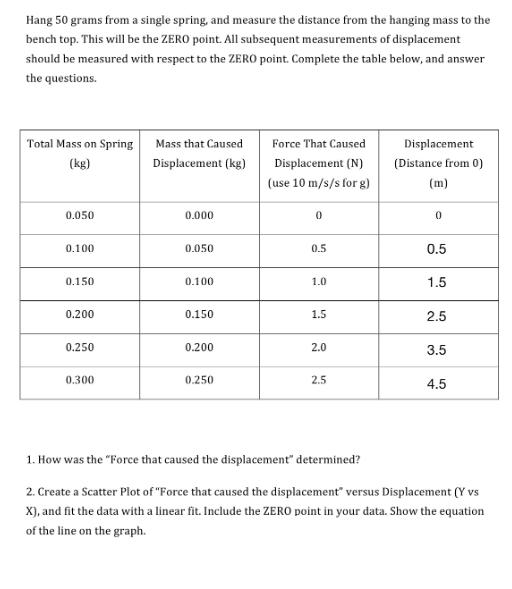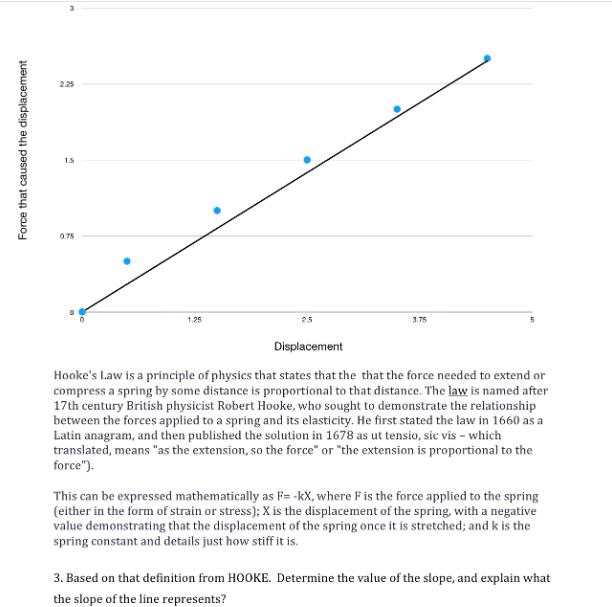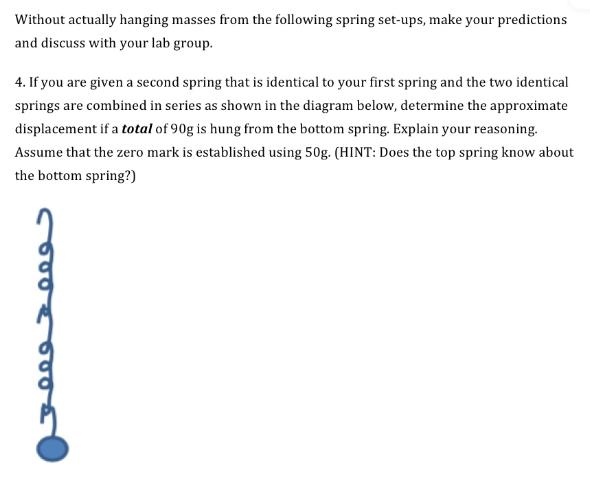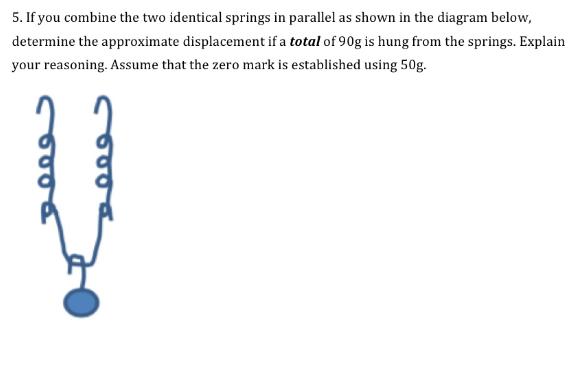Answered step by step
Verified Expert Solution
Question
1 Approved Answer
Hang 50 grams from a single spring, and measure the distance from the hanging mass to the bench top. This will be the ZERO




Hang 50 grams from a single spring, and measure the distance from the hanging mass to the bench top. This will be the ZERO point. All subsequent measurements of displacement should be measured with respect to the ZERO point. Complete the table below, and answer the questions. Total Mass on Spring (kg) 0.050 0.100 0.150 0.200 0.250 0.300 Mass that Caused Displacement (kg) 0.000 0.050 0.100 0.150 0.200 0.250 Force That Caused Displacement (N) (use 10 m/s/s for g) 0 0.5 1.0 1.5 2.0 2.5 Displacement (Distance from 0) (m) 0 0.5 1.5 2.5 3.5 4.5 1. How was the "Force that caused the displacement" determined? 2. Create a Scatter Plot of "Force that caused the displacement" versus Displacement (Y vs X), and fit the data with a linear fit. Include the ZERO point in your data. Show the equation of the line on the graph. Force that caused the displacement 2.25 1.5 0.75 1.25 25 3.75 Displacement Hooke's Law is a principle of physics that states that the that the force needed to extend or compress a spring by some distance is proportional to that distance. The law is named after 17th century British physicist Robert Hooke, who sought to demonstrate the relationship between the forces applied to a spring and its elasticity. He first stated the law in 1660 as a Latin anagram, and then published the solution in 1678 as ut tensio, sic vis - which translated, means "as the extension, so the force" or "the extension is proportional to the force"). This can be expressed mathematically as F= -kX, where F is the force applied to the spring (either in the form of strain or stress); X is the displacement of the spring, with a negative value demonstrating that the displacement of the spring once it is stretched; and k is the spring constant and details just how stiff it is. 3. Based on that definition from HOOKE. Determine the value of the slope, and explain what the slope of the line represents? Without actually hanging masses from the following spring set-ups, make your predictions and discuss with your lab group. 4. If you are given a second spring that is identical to your first spring and the two identical springs are combined in series as shown in the diagram below, determine the approximate displacement if a total of 90g is hung from the bottom spring. Explain your reasoning. Assume that the zero mark is established using 50g. (HINT: Does the top spring know about the bottom spring?) 5. If you combine the two identical springs in parallel as shown in the diagram below, determine the approximate displacement if a total of 90g is hung from the springs. Explain your reasoning. Assume that the zero mark is established using 50g. 005
Step by Step Solution
There are 3 Steps involved in it
Step: 1
The series of questions provided are related to a physics lab experiment involving Hookes Law which expresses that the force F needed to extend a spri...
Get Instant Access to Expert-Tailored Solutions
See step-by-step solutions with expert insights and AI powered tools for academic success
Step: 2

Step: 3

Ace Your Homework with AI
Get the answers you need in no time with our AI-driven, step-by-step assistance
Get Started


